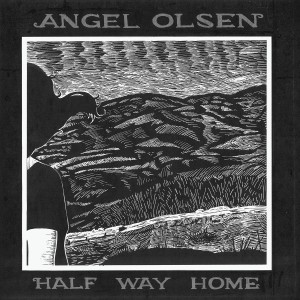 It’s a cliché to say that such-and-such a singer is a “unique voice,” but I have to resort to it in the case of Angel Olsen. In a world full of cutesy and waif-like vocals from female singers in all genres, Olsen’s decidedly non-angelic style immediately telegraphs her seriousness. Her husky warble is unadorned, the perfect instrument for delivering her nakedly honest and emotional lyrics.
It’s a cliché to say that such-and-such a singer is a “unique voice,” but I have to resort to it in the case of Angel Olsen. In a world full of cutesy and waif-like vocals from female singers in all genres, Olsen’s decidedly non-angelic style immediately telegraphs her seriousness. Her husky warble is unadorned, the perfect instrument for delivering her nakedly honest and emotional lyrics.
The arrangements on Half Way Home, Olsen’s sophomore full-length, are sparse almost to the point of non-existence, the better to focus on those lyrics. With a fingerpicked gut-string guitar, a little accordion, some bass guitar and brushed snare, songs like the opener “Acrobat” are more jazz than folk in presentation. It’s a brave and stunning vocal performance, this double-waltz love song – like pretty much all of these 11 songs, really. She lays it all on the line, vocally and emotionally.
At times – on the dirge-like seven-minute waltz “Lonely Universe,” or the even bleaker “Can’t Wait Until Tomorrow” for example – Olsen is a female doppelganger to Bonnie “Prince” Billy (with whom she has toured) at his darkest and starkest. Then on “The Waiting,” you know she’s been listening to Carole King and those other Brill Building pioneers. It’s a slice of verse-chorus-verse girl-group pop complete with major-third harmonies, the occasional discordant electric guitar fill stabbing through the frame of this otherwise semi-sunny picture. Or she’s the love child of Joni Mitchell (affectless vocals over unexpected progressions in “You Are Song”) and Roy Orbison (guitar jangle and octave-leaping vocals on the deconstructed rocker “Free”).
The cleverest is “Miranda,” a bitter love song built around the warning given to accused criminals when arrested here in the U.S., plus a handful of Western-movie cliches, as in this verse:
Don’t stand too close to me darlin’ / keep your hands where I can see. / Don’t you know you’re wanted in 50 states? / I love you dear but it’s not up to me / and it’s never quite been, you see.
For a perfect example of the emotional starkness of this music, check out the video for “Tiniest Seed,” which is the album’s final track. It’s yet another song of loss and heartache, this time with elements of country soul. The black-and-white film treatment perfectly captures the song’s mood, I think.
Angel Olsen is one to keep an eye on. She can write songs like nobody’s business, and her vinegar-and-honey voice may not make her a pop star but it’s a perfect instrument for her unflinching poetry.
(Bathetic Records, 2012)
